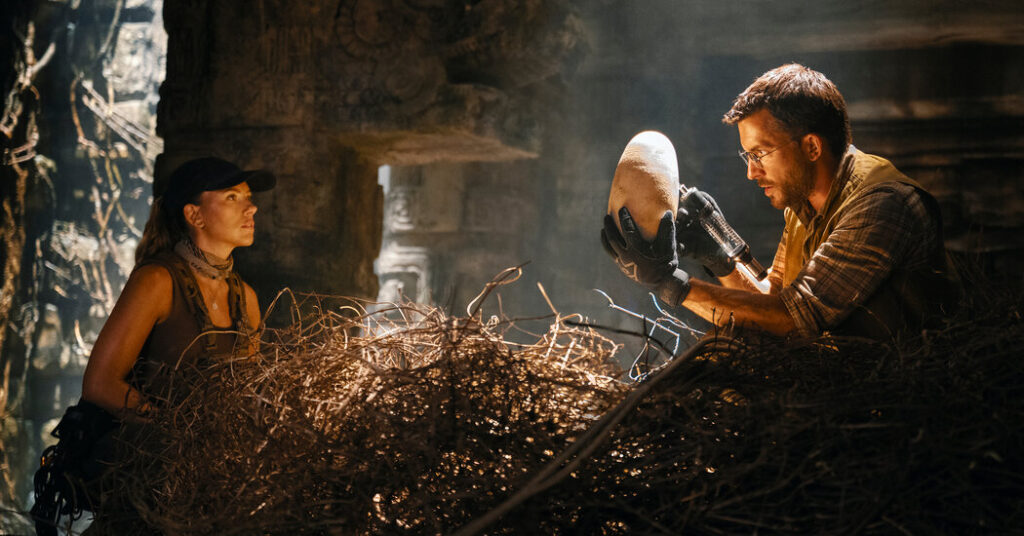President Trump’s desire to “make Hollywood great again” by wielding his preferred economic weapon — tariffs — has sent a shiver through Britain’s film industry.
British producers, camera workers, costume designers and other film crew woke up Monday to Mr. Trump’s message that he wanted to impose 100 percent tariffs on films made in “foreign lands.” This threat is particularly alarming in Britain, where Hollywood blockbusters are a critical part of the industry.
“It came completely out of the blue,” said Philippa Childs, the head of Bectu, the British union for workers in the creative arts. “It’s pretty frightening.”
Last year, nearly 90 percent of the 5.6 billion pounds, or $7.8 billion, spent on film and high-end TV production in Britain came from abroad, mostly the United States, such as the upcoming “Jurassic World Rebirth” and “The Fantastic Four: First Steps.” Britain’s biggest and most esteemed studios are home to streaming giants like Netflix, Disney+ and Amazon Prime. For decades, productions have been drawn to Britain by its generous tax breaks but also its experienced work force, which has been making Hollywood hits since “Star Wars” in the 1970s.
Mr. Trump has, so far, not followed through on this threat, and it’s not clear how he would carry it out. But the British industry is still recovering from disruptions caused by the coronavirus pandemic and then the 2023 actors’ and screenwriters’ strikes in the United States, and the concern is that uncertainty about tariffs could wipe out that progress.
“Studios around London are really filling up, and people are getting back to work,” Ms. Childs said. “Our fear would be that those studios suddenly become empty again if this were to become a reality.”
Bectu members are still living with the memories of the strikes, Ms. Childs said. Eighty percent of members Bectu surveyed at the time said their jobs had been affected, with three-quarters not working.
Marcus Ryder, chief executive of the Film and TV Charity, which supports industry workers with their mental health and finances, is preparing for an influx of requests for help.
“The uncertainty is really disempowering,” he said. People “have no idea what the tariffs mean, nor how to react to them.” It is “very destabilizing,” he added.
Mr. Ryder said there was a fear among companies and workers that their industry would be decimated if people, concerned that they wouldn’t be able to pay their bills, left their jobs. Support that was given during the pandemic and the strikes, such as cash grants, could not be provided over the long term if tariffs were enforced.
“Even a short-term tariff could have a long-term devastating effect on the work force,” he said.
Mr. Trump’s suggestions of tariffs are “concerning,” said Adrian Wootton, the chief executive of the British Film Commission, which helps attract productions to Britain. He said his organization would meet with the government and other industry figures to discuss its concerns.
The British government is in “active discussions with the top of the U.S. administration” about these potential tariffs and working to establish what might be proposed, Chris Bryant, a minister in the department overseeing culture, told lawmakers in Parliament on Wednesday. “This is a very fluid situation, and we will continue to take a calm and steady approach.”
Mr. Bryant added that a lot of concerned companies had reached out. One of the first was Pinewood Group, which owns the large studio famous for filming the Bond movies.
At the same time, Britain and the United States are reportedly close to agreeing to a pact that would ease some of the impact of recent increases in U.S. tariffs.
Many trade experts question how tariffs on films could be enforced. Major film productions are increasingly international, with cast and crew from different countries and with different aspects of filmmaking, like filming, postproduction, visual effects and distribution, taking place in different locations. Determining what exactly is a “foreign” film and how to impose tariffs on services would be complex.
“I don’t think it can be done,” said David Henig, a trade expert in London. Instead, it’s more likely that American tax breaks would be increased, he said. “Obviously that does make it a threat to the U.K. and lots of other countries that have been handing out tax credits to make films,” he added.
Gov. Gavin Newsom of California countered Mr. Trump’s tariffs suggestion on Monday with his own proposal: a $7.5 billion federal film tax credit. It would be the largest single government subsidy program ever for the industry in the United States, and the first of its kind at the federal level.
Even without tariffs, higher tax incentives in the United States would “inevitably” have an impact on the British industry, Ms. Childs of Bectu said.
To some extent, the increasing dependence on American productions is a challenge for the British industry and its workers. Movies likes “Wicked” and “Mission: Impossible — Dead Reckoning” and TV shows like the “Game of Thrones” spinoff “House of the Dragon” were filmed predominantly in the southeast of England. The British government has increased tax breaks for smaller productions in an effort to bolster Britain’s independent film industry.
Those tax credits will help, Ms. Childs said, “but I don’t think it’s going to fill the void of U.S. investment.”
https://www.nytimes.com/2025/05/08/business/trump-movie-tariffs-uk.html


